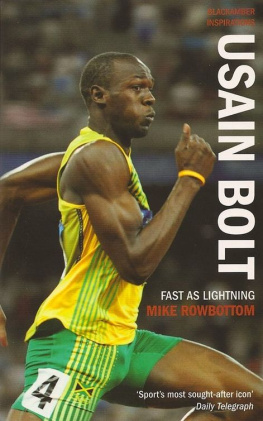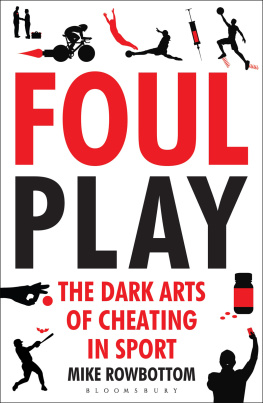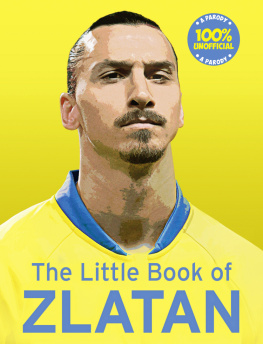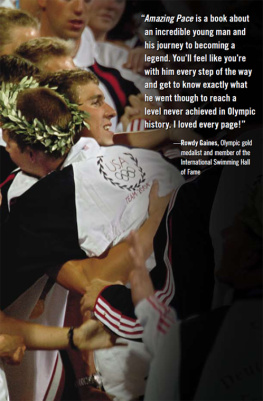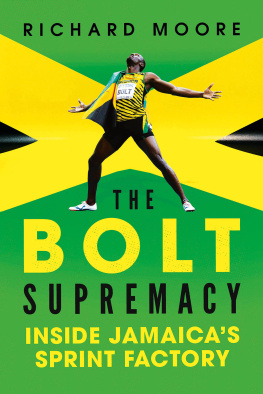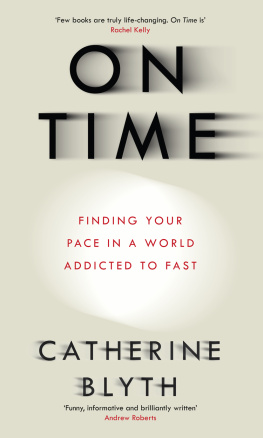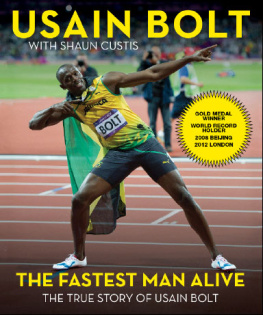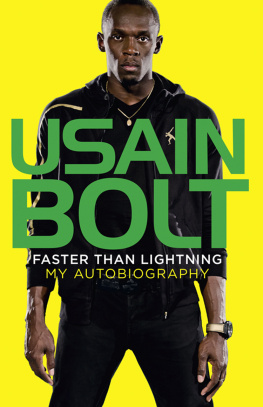Mike Rowbottom - Usain Bolt: Fast As Lightning
Here you can read online Mike Rowbottom - Usain Bolt: Fast As Lightning full text of the book (entire story) in english for free. Download pdf and epub, get meaning, cover and reviews about this ebook. year: 2011, publisher: Arcadia Books Limited, genre: Detective and thriller. Description of the work, (preface) as well as reviews are available. Best literature library LitArk.com created for fans of good reading and offers a wide selection of genres:
Romance novel
Science fiction
Adventure
Detective
Science
History
Home and family
Prose
Art
Politics
Computer
Non-fiction
Religion
Business
Children
Humor
Choose a favorite category and find really read worthwhile books. Enjoy immersion in the world of imagination, feel the emotions of the characters or learn something new for yourself, make an fascinating discovery.
- Book:Usain Bolt: Fast As Lightning
- Author:
- Publisher:Arcadia Books Limited
- Genre:
- Year:2011
- Rating:4 / 5
- Favourites:Add to favourites
- Your mark:
- 80
- 1
- 2
- 3
- 4
- 5
Usain Bolt: Fast As Lightning: summary, description and annotation
We offer to read an annotation, description, summary or preface (depends on what the author of the book "Usain Bolt: Fast As Lightning" wrote himself). If you haven't found the necessary information about the book — write in the comments, we will try to find it.
Usain Bolt: Fast As Lightning — read online for free the complete book (whole text) full work
Below is the text of the book, divided by pages. System saving the place of the last page read, allows you to conveniently read the book "Usain Bolt: Fast As Lightning" online for free, without having to search again every time where you left off. Put a bookmark, and you can go to the page where you finished reading at any time.
Font size:
Interval:
Bookmark:
By Dame Kelly Holmes, MBE,
Double Olympic Champion
MIKE ROWBOTTOM HAS WRITTEN about me since I started my senior international career in athletics in 1993, and has witnessed many of my highs and my lows, my tears and my triumphs. He saw me pull up injured in my 1500 metres heat when I was the favourite to win at the 1997 World Championships in Athens, and he was in Budapest seven years later when I was tripped and fell as I went for what would have been my first global gold at the World Indoor Championships.
He was there in 2002 when I won the Commonwealth title for a second time in front of that unforgettable home crowd in Manchester, and at the Athens Olympics two years later when I won my 800/1500 metres double.
When I retired from the sport in 2005 I put Mike on my podium of writers for the articles he had done about me for the Independent. Since then, for insidethegames.biz, he has continued to cover a huge amount of my work including my mentoring initiative On Camp With Kelly, the establishment of my charity, the Dame Kelly Holmes Legacy Trust, and my role as the president of Commonwealth Games England.
Given my Jamaican heritage, albeit very distant from anything I know, I was particularly interested to read the chapter dealing with that countrys rich running tradition, and to see where Usain Bolt fitted into it. Over the last two years, Usain has literally exploded into the forefront of everyones mind, becoming a massively popular figure in world athletics and sport, both because of his astounding sprint performances and his lively and high-spirited personality . But he has not been an overnight sensation he has had his struggles to get to where he is, and I can identify very well with the frustration that must have caused him.
There are only moments in history that we sit up and take note of amazing events and for the sport of athletics it is great to have an athlete like Usain realising his talents, and this book offers some fascinating insights into his character, his development and his future potential.
THE ELECTRONICALLY ENHANCED SOUND of a starting pistol reverberates around the Birds Nest stadium in Beijing, and the 2008 Olympic 100 metres final is underway. For the 100,000 spectators packed into the intricately wrought arena, and a worldwide TV audience of 178 million, this is the high point of the first Saturday night of athletics at the Games. Earlier in the evening they have seen the previous years world 100 metres champion, Tyson Gay, whose preparations for the Games have been affected by injury, knocked out in the semi-final. Which means that only one man, Asafa Powell, is likely to stand between the Olympic gold medal and the fellow Jamaican getting into his stride three lanes inside him. At 6ft 2in tall, Powell is a broad, powerful athlete the kind of athlete who has been winning the Olympic 100 metres title since the post-war Games resumed in London in 1948. And he has used that physique to good effect in the previous three years, setting world records of 9.77 seconds and 9.74 seconds.
But the man in lane four Usain Bolt looks a different kind of runner.
Hes tall in fact, at 6ft 5in he is too tall for 100 metres sprinting according to conventional coaching. Even his own coach, Glen Mills, has suggested that his long legs and frame are better suited to longer events such as the 200 or 400 metres, as it takes him so long to unfurl himself out of the blocks. Bolt has already confounded traditional coaching theory, however, by reducing Powells record to 9.72 seconds at a meeting held two months before the Beijing Games. And in only his fifth serious race at the distance. Freaky. So the question being asked as the Olympics got underway was: is this a Bolt that is going to strike more than once in the same place?
The 21-year-olds performance in the earlier rounds has already indicated the answer to that question . After jogging home in his quarter-final in a time of 9.92 seconds a world record just 20 years earlier he had announced laconically: I just ran the first 50 metres. Then I looked around to make sure I was safe and I shut off. The words, by themselves, suggest arrogance. And yet their delivery, with a disarming smile, renders them charming.
Before the start of an Olympic 100 metres final there is usually an extraordinary state of tension among the competitors. Unlike World Cup finalists , the men who gather for this four-yearly contest know they have around 10 seconds to justify their sporting existence. The sprinters pace up and down, some deliberately glaring at their opponents, others deliberately avoiding any others gaze. They shake out their limbs, already warmed and prepared, as if one final shake will make them faster.
What they dont do is play around. And yet this is what Bolt does. As the runners are announced, he does a little dance it later turns out to be one of his favourite moves from the Jamaican dancehall scene that he loves so much. And when it is his turn to have his name read out, he breaks out into a broad grin and assumes the archer-like stance that is to become his Lightning Bolt trademark left arm outstretched with index finger pointing towards the sky, right arm drawn back as if pulling on the string of a bow before firing a make-believe arrow into the tumult around him.
Bolts start in the final does not appear exceptional , an impression later confirmed by the release of his reaction time to the gun at 0.165 seconds, he is the second slowest in the field of eight. At the 30 metres mark, he is no more than a more easily visible bobbing head among many, with Richard Thompson, of Trinidad and Tobago, slightly ahead of the field. But what happens in the next 50 metres is astonishing. There is a sound that goes through huge sporting crowds when something extraordinary happens . When Zinedine Zidane volleys a goal for Real Madrid from outside the penalty. When Muhammad Ali comes off the ropes to down the giant, hitherto oppressive figure of George Foreman. When Michael Johnson wins the Olympic 200 metres title in 19.32 seconds. 19.32 seconds! And that is the sound which surges within the Birds Nest stadium on this humid night as the man who stands head and shoulders above the rest translates superior height into superior speed.
By the 80 metres mark, the wave of runners who have been accompanying Bolt are now the wave behind as his sustained speed takes him into his own space. He is running free, out on his own, a clear and compelling spectacle. After glancing across to his right, where the figure of his friend Powell might conceivably be, but isnt, he switches from being a runner to being a celebrant. With 20 metres remaining, his arms drop down to his sides. Ten metres further on, he leans backwards and thumps his right hand onto his heart. Crossing the line, his face split by a grin, his energy overwhelms him and he carries on running and bounding his way round towards the back straight. The noise in the Birds Nest reverberates in the ear. Its one of those moments. And all those present witness it, and always will have witnessed it
But for the first time in a little more than ten seconds , the tall figure in the yellow and green of Jamaica is no longer the centre of attention. That is now the digital clock standing at the finish line, which has this figure on it: 9.68 very soon adjusted to its official mark of 9.69. Its the first 100 metres race to be run in under 9.70 seconds without a following wind exceeding the sports allowable limit for record purposes of 2.00 metres per second. And all around the stadium, all around the world, people are saying the same thing: How fast could he run if he really tried? Or even: How fast could he run if he really tried and he didnt have one of his laces undone?
At the 1924 Olympics in Paris, the great Finnish middle-distance runner, Paavo Nurmi, won the double of 1500 metres and 5000 metres titles in the space of an hour, taking the first of them with such ease that one writer observed that he was probably the only man ever who has been able to slow down on purpose in the Olympic Games.
Font size:
Interval:
Bookmark:
Similar books «Usain Bolt: Fast As Lightning»
Look at similar books to Usain Bolt: Fast As Lightning. We have selected literature similar in name and meaning in the hope of providing readers with more options to find new, interesting, not yet read works.
Discussion, reviews of the book Usain Bolt: Fast As Lightning and just readers' own opinions. Leave your comments, write what you think about the work, its meaning or the main characters. Specify what exactly you liked and what you didn't like, and why you think so.

